
PORCHES sunlit in all seasons
Countless archival renderings and photographs, particularly from the years 1870 to 1920, show even outdoor porches fully furnished in suites of wicker, rattan, or painted furniture. An outdoor porch might have served as a three-season space with the installation of seasonal glazing. Small rugs, tea tables, and oil or electric lamps provided all the comforts of a furnished room. In Boston, the Victorian Shingle Style house (above right) dates to 1889 but its front porch was long ago enclosed, perhaps as early as 1910, with period windows, creating a generous sunroom appropriately furnished with Arts & Crafts-era furniture. Those conventions of porch living can be brought into the sunroom year-round. More formal sun parlors may nod to the outdoors with just a plant or two.
the history of the sunroom, like many things aesthetic and architectural, can be traced to ancient Rome, with its atria, and to the garden rooms of Renaissance Italy. During the Victorian era, the breakfast room might face east but it was hardly a sunroom; conservatories were geared toward raising plants. It was in the early-20th century that sunporches and sun parlors became common, appearing on plans for new houses by architects and mail-order designers alike. Several factors probably contributed to the new popularity. At the time, the "cure" for tuberculosis was a stay at a sanitarium in the mountain air; it was accepted that fresh air and sunlight were good for us. The 1918 influenza epidemic added to the demand. Magazine articles touted the health benefits of a sunroom as well as a sleeping porch. Sunrooms were included in all the period's house styles, from Tudor and Spanish to Dutch Colonial. Many a sunroom was added to an older house. Some were simply a glazed porch. Others were fancier with decoratively laid tile floors, French doors, and maybe even a tiled fountain in the floor or on the wall.
This story is from the {{IssueName}} edition of {{MagazineName}}.
Start your 7-day Magzter GOLD free trial to access thousands of curated premium stories, and 9,000+ magazines and newspapers.
Already a subscriber ? Sign In
This story is from the {{IssueName}} edition of {{MagazineName}}.
Start your 7-day Magzter GOLD free trial to access thousands of curated premium stories, and 9,000+ magazines and newspapers.
Already a subscriber? Sign In

faded luxe IN A RETURN TO SAVANNAH
Residents of the Blue Ridge Mountains find their city home in a converted commercial building in beautiful Savannah, Georgia.
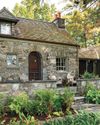
a hudson valley VERNACULAR
When Harlan Bratcher started looking for a country house in New York, in 1990, he knew what he wanted-something peaceful and serene, an escape from the hectic lifestyle of Manhattan.
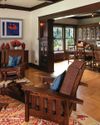
the Dr. Mills house RESTORED
In rural Washington State, a dedicated couple bring back a 1912 bungalow that once had been the town's hospital.

The Right Masonry Tool for Repointing
The mortar between individual bricks or stones begins to erode after many years. That might be attributed to rain and wind, leaky gutters, building settlement, or such chemical agents as de-icing salts.

How To Remove Wallpaper
There's more than one way to do it; try them all until you find what works for your situation.

living with PLASTICS anxiety
Plastics are ubiquitous in modern life. Even houses built long before vinyl caught on are now full of polymer-based products, from the hoses in pull-down faucets to plastic light switches. Now that we know exposure to certain plastics can be hazardous to human health, we need guidance on how to evaluate building products for potential impacts.
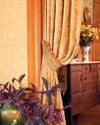
homey Craftsman Textiles today
For bungalows, Craftsman houses, and Tudors that might have rather severe woodwork and furniture, textiles are a critical part of the decorative scheme.

Navigating the Lumberyard - Here's some lumber lingo you should know before you venture into a lumberyard.
Here's some lumber lingo you should know before you venture into a lumberyard. Almost everyone fixing an old house will end up at a lumberyard-whether it's a local supplier or the organized aisles of a big-box home-improvement store.
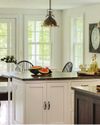
a farmhouse renewed
Sensitive renovations and restoration work preserved a house that dates to 1799.
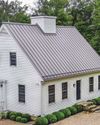
AN OVERVIEW OF METAL ROOFING
METAL ROOFS ARE RESURGENT, FOR GOOD REASONS.